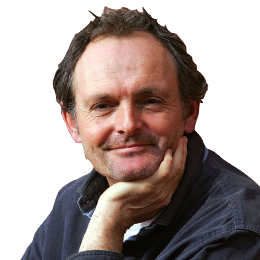HEADING FOR THE HILLS
MARTIN KIRBY
Don't be afraid of the dark
The vast majority of people are now getting the message that our life patterns and general short-sighted hedonism are not good for our world or ourselves, but change is easier said than done, isn't it?
Before bed I go outside with the dogs, look up at Venus, Jupiter and the constellations and count my lucky stars. I mean, my circadian rhythms are as good as they can be for a 56 year old with a bladder than won't let me sleep in an uninterrupted eight hour stretch.
How are your circadian rhythms, by the way? What - nobody has ever asked you before?
During the seven years prior to our move to the Priorat in 2001 my circadian clock was all over the place and I was not in good shape. I was the night editor on a daily newspaper in England, never certain when I would trundle home along deserted city highways illuminated kilometre after kilometre just for me.
Now you may be thinking body clock here, which is definitely related but not the exact point. Circadian rhythms are what happens to you as a direct consequence of light and darkness – mental, physical, and behavioural changes that affect you and most living things, including plants and even tiny micro-organisms.
This is a vital sleep-pattern and health issue that I predict will become a widely understood term any time now as we humans are forced to stop and recalibrate. It is another step on the journey to find out what really makes us tick... or not. Have a search on the web.
The vast majority of people are now getting the message that our life patterns and general short-sighted hedonism are not good for our world or ourselves, but change is easier said than done, isn't it? How can we individually act to make a difference when the issues are so complex, political and beyond our control?
We all know a household somewhere that is permanently lit up like a Christmas tree or oil refinery. Are these the residences of people with money to burn, who don't care about energy supply and perhaps are scared of the dark? They have almost certainly never seen the mesmerizing Milky Way.
I used to be, afraid of the dark that is; when I was about six. Young children are understandably reluctant to end the day. Making friends or at least learning to live with the dark hours is one of life's salutary, edifying lessons. I'm just not sure it is taught any more, with grim consequences.
Light addiction is a beacon to our complex failings and it is blinding us to the damage being done.
What must the rest of the Universe think when the inevitable intelligent life sees Earth suddenly beaming like this? You don't have to go back many generations to find the shadow side of Earth in complete darkness. Have you seen one of the “night” maps of our planet now, showing the wealthy countries pulsing with artificial light?
Here in the Priorat, as in other remote parts of Catalonia and Iberia, we have the best planetarium of all, where soft village lighting is beautifully minimal and we are spared the overlapping spheres of reflected, refracted glare of over-lit cities, suburbs and industries. It grows dark yet we can see far more, into infinity.
But the truth is that nearly all of night-time Europe is, like much of America, a nebula of light, and there is now significant scientific research suggesting that light pollution can have lasting adverse effects on both human and wildlife health. Yes, your circadian rhythms. It is, without doubt, out of control, pervasive, costly environmental pollution. Artificial life extends a productive day and allows longer recreation, but where it is excessive it not only affects we humans – they now say the circadian cycle affects up to 15 per cent of our genes - but plays havoc with the rhythms of nature itself.
So do some good and turn out the light if you don't need it. If we all flick more switches we can simply and instantly improve well-being. If the politicians wise up we can significantly cut energy waste overnight.
Then maybe two hundred million urban Europeans might get their first glimpse of the Milky Way.

